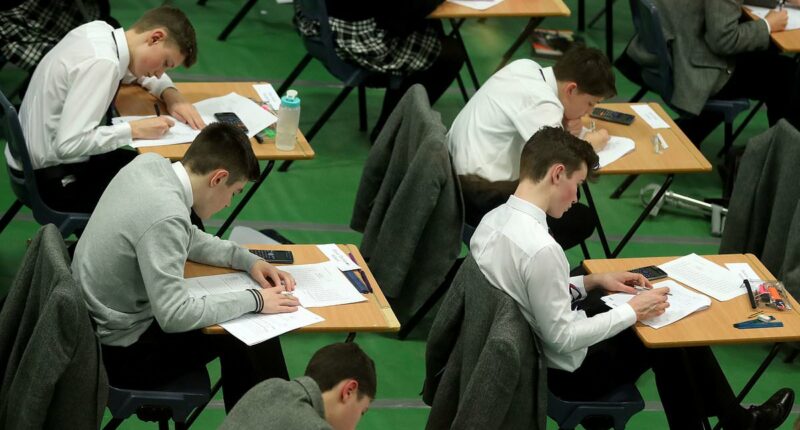Share this @internewscast.com
GCSE resits for English and Maths could be scrapped amid the pass rate falling to its lowest level in a decade.
The present policy mandates students who don’t pass these two essential GCSE subjects to retake them until they secure at least a grade 4 in both, up until the age of 18.
However, yesterday’s results saw the GCSE pass rate for English and Maths hit a record low, amid fears that some pupils are being left behind.
This follows comments from Bridget Phillipson, the Education Secretary, who noted that white working-class children are among the least likely to achieve these benchmarks.
The pass rate for English dropped by 1.7 percentage points, reaching 60.2 this summer, marking the lowest result since 2004. Meanwhile, 58.3 per cent of students across the UK passed their maths GCSE this year, down from 59.5 per cent the previous year.
At the same time, Jill Duffy, CEO of the OCR exam board, cautioned that the rate of GCSE resits for Maths and English is at an ‘all-time high’ as the government faces a ‘resit crisis’.
Only 23.1 per cent of students who retook their English GCSE this year received a standard pass, with just 18.2 per cent passing in maths.
The government now considers potentially ending mandatory resits, as a Whitehall source indicated that ministers might abolish compulsory retakes to address the increasing number of failing students, The Telegraph has reported.

GCSE resits for English and Maths could be scrapped after the pass rate fell to lowest level in a decade. The current model requires students who fail these two core subjects at GCSE level to resit them repeatedly until they achieve a least a grade 4 in both subjects, up to the age of 18 (file image)
A member of a review panel told the publication that experts could be set to implement a ‘building block’ replacement, with pupils who fail the two subjects assessed on their skills, rather than having to undergo resit exams.
They added that the current system was based upon a ‘flawed mindset that says if (pupils) just keep resitting enough times, one day they’ll strike lucky.’
The review of curriculum and assessments, commissioned by Ms Phillipson and led by Professor Becky Francis, is set to be published this year and is likely to call for rapid changes to mandatory resists.
In an interim report published in march, Prof Francis acknowledged the ‘relationship between achieving grade 4… and access to future opportunities’.
However, she also called for ‘greater nuance in measures to ensure that as many learners as possible can achieve positive outcomes’.
Meanwhile, a letter seen by The Telegraph sent by Labour MP Helen Hayes, also chair of the Commons’ education committee, called upon Prof Becky Francis to implement ‘more practical and applied alternatives’ for those unable to achieve a grade 4 in Maths.
One in five GCSE entries achieved at least a grade 7 or A following a rise on last year this summer.
While the failure rates this year were broadly similar to 2024, there was a huge surge in the number of children retaking the subjects after failing last summer – up by nearly a fifth for English and by 10.8 per cent for maths.

It came after Bridget Phillipson (pictured), the Education Sectetary, said that white working class children in particular were some of the least likely to hit these targets

The overall pass rate for English dropped 1.7 percentage points to hit 60.2 this summer, the worst result since 2004, while 58.3 per cent of all pupils across the UK passed their maths GCSE this year, down from 59.5 per cent last year. Pictured: pupils receive their results on August 21

Just 23.1 per cent of pupils who resat their English GCSE this year received a standard pass yesterday, with the figure dropping to a mere 18.2 per cent for maths. Pictured: pupils at Solihull School open their results
This meant almost 28,000 extra pupils retaking their English language GCSE this year and 21,000 for maths.
Education leaders have called for the Government’s policy of compulsory resits in the two subjects at GCSE to be scrapped.
Other alternatives that have been suggested include requiring teenagers to undergo a pass or fail assessment or a functional skills test.
Calling for an urgent need for young people to be able to ‘break out of the resit cycle’, Ms Duffy added: ‘Nearly a quarter of GCSE maths and English entries are resits. This is at an all-time high.
‘Less than a fifth of resitting students achieved the grade 4 they need to break out of the resit cycle.
‘Tinkering at the edges of policy won’t fix this. We need fundamental reform to maths and English secondary education – especially at Key Stage 3 – to support those who fall behind in these crucial subjects.’
She added of the gender gap: ‘Boys are slowly catching up with girls, but the GCSE attainment gap remains significant.’
Meanwhile, Pepe Di’lasio, general secretary of the Association of School and College Leaders, described the process of young people having to undergo resit exams as ‘utterly demoralising’.

Jill Duffy (pictured), chief executive of OCR exam board, warned that the rates of GCSE resits for Maths and English are at an ‘all time-high’ as the government grapples with a ‘resist crisis’

Pepe Di’lasio, general secretary of the Association of School and College Leaders, described the process of young people having to undergo resit exams as ‘utterly demoralising’. Pictured: students receive their GCSE results at Nottingham High School on August 21

Paul Whiteman (pictued), general secretary of school leaders’ union NAHT, said that the current GCSE resit policy is ‘not fit for purpose’. He added: ‘What is needed are more appropriate and engaging alternatives to GCSEs in English and maths at KS4’
He added: ‘Once again we see that the majority of students who retake GCSE English and maths in post-16 education under a government policy of mandatory resits continue to fall short of a grade 4 standard pass.
‘It is utterly demoralising for these young people and there has to be a better way of supporting literacy and numeracy.’
Mr Di’lasio cited the disruption caused by the Covid-19 pandemic as responsible for regional disparities in the results.
He added that disadvantage students had been ‘most severely affected’, with it made significantly harder to close the gaps in educational attainment caused by socioeconomic factors.
Meanwhile, Paul Whiteman, general secretary of school leaders’ union NAHT, said that the current GCSE resit policy is ‘not fit for purpose’.
He added: ‘NAHT has long called for reform of the current policy that forces students into repeated resits, which is demotivating and ineffective.
‘What is needed are more appropriate and engaging alternatives to GCSEs in English and maths at KS4.’

The government could be set to ditch compulsory resits altogether, with a Whitehall source allegedly stating that ministers will consider a variety of options to help tackle the rise in failing pupils, The Telegraph has reported (file image)

One in five GCSE entries achieved at least a grade 7 or A following a rise on last year this summer. Roughly one in five have got A/7 grades over the last 15 years, but the pandemic frustrated the regulator’s efforts because teacher assessment led to massive grade inflation

While the failure rates this year were broadly similar to 2024, there was a huge surge in the number of children retaking the subjects after failing last summer – up by nearly a fifth for English and by 10.8 per cent for maths (file image)

The proportion of top grades rose every single year between 2002 and 2011. However, after the Tories won the election in 2010 they instructed Ofqual to make sure the proportion getting these top grades remained roughly the same each year
While traditional A*-G grades are used in Northern Ireland and Wales, in England these have been replaced with a 9-1 system, where 9 is the highest.
A 4 is broadly equivalent to a C grade and a 7 is broadly equivalent to an A.
The proportion of top grades rose every single year between 2002 and 2011.
However, after the Tories won the election in 2010 they instructed Ofqual to make sure the proportion getting these top grades remained roughly the same each year.
This is adjusted slightly for the ability of each cohort, which is measured by sample tests earlier in the year.
Roughly one in five have got A/7 grades over the last 15 years, but the pandemic frustrated the regulator’s efforts because teacher assessment led to massive grade inflation.
While grades have now been brought back down they are still higher than before the disruption.
Overall UK entries for GCSEs have dropped slightly – down 0.4 per cent on 2024, according to JCQ data.
A breakdown of the data shows that while 16-year-olds still make up the vast majority of students taking GCSEs, entries from this group are down 1.4 per cent on last year.
Entries from students aged 17 and over are up 12.1 per cent to 482,402 compared with 430,377 in 2024.

















